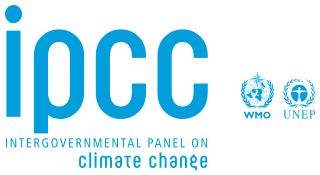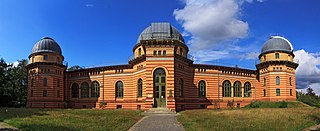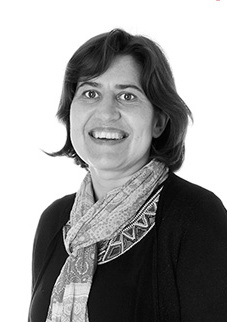Related Research Articles

The Intergovernmental Panel on Climate Change (IPCC) is an intergovernmental body of the United Nations. Its job is to advance scientific knowledge about climate change caused by human activities. The World Meteorological Organization (WMO) and the United Nations Environment Programme (UNEP) established the IPCC in 1988. The United Nations endorsed the creation of the IPCC later that year. It has a secretariat in Geneva, Switzerland, hosted by the WMO. It has 195 member states who govern the IPCC. The member states elect a bureau of scientists to serve through an assessment cycle. A cycle is usually six to seven years. The bureau selects experts to prepare IPCC reports. It draws the experts from nominations by governments and observer organisations. The IPCC has three working groups and a task force, which carry out its scientific work.

There is a strong scientific consensus that the Earth is warming and that this warming is mainly caused by human activities. This consensus is supported by various studies of scientists' opinions and by position statements of scientific organizations, many of which explicitly agree with the Intergovernmental Panel on Climate Change (IPCC) synthesis reports.
The Summary for policymakers (SPM) is a summary of the Intergovernmental Panel on Climate Change (IPCC) reports intended to aid policymakers. The form is approved line by line by governments: "Negotiations occur over wording to ensure accuracy, balance, clarity of message, and relevance to understanding and policy."

The IPCC Third Assessment Report (TAR), Climate Change 2001, is an assessment of available scientific and socio-economic information on climate change by the IPCC. Statements of the IPCC or information from the TAR are often used as a reference showing a scientific consensus on the subject of global warming, although a small minority of scientists take issue with the UN assessments. The Third Assessment Report (TAR) was completed in 2001 and consists of four reports, three of them from its Working Groups: Working Group I: The Scientific Basis; Working Group II: Impacts, Adaptation and Vulnerability; Working Group III: Mitigation; Synthesis Report. A number of the TAR's conclusions are given quantitative estimates of how probable it is that they are correct, e.g., greater than 66% probability of being correct. These are "Bayesian" probabilities, which are based on an expert assessment of all the available evidence.

The Second Assessment Report (SAR) of the Intergovernmental Panel on Climate Change (IPCC), published in 1995, is an assessment of the then available scientific and socio-economic information on climate change. The report was split into four parts: a synthesis to help interpret UNFCCC article 2, The Science of Climate Change, Impacts, Adaptations and Mitigation of Climate Change, Economic and Social Dimensions of Climate Change. Each of the last three parts was completed by a separate Working Group (WG), and each has a Summary for Policymakers (SPM) that represents a consensus of national representatives.

The Special Report on Emissions Scenarios (SRES) is a report by the Intergovernmental Panel on Climate Change (IPCC) that was published in 2000. The greenhouse gas emissions scenarios described in the Report have been used to make projections of possible future climate change. The SRES scenarios, as they are often called, were used in the IPCC Third Assessment Report (TAR), published in 2001, and in the IPCC Fourth Assessment Report (AR4), published in 2007. The SRES scenarios were designed to improve upon some aspects of the IS92 scenarios, which had been used in the earlier IPCC Second Assessment Report of 1995. The SRES scenarios are "baseline" scenarios, which means that they do not take into account any current or future measures to limit greenhouse gas (GHG) emissions.

The economics of climate change concerns the economic aspects of climate change; this can inform policies that governments might consider in response. A number of factors make this and the politics of climate change a difficult problem: it is a long-term, intergenerational problem; benefits and costs are distributed unequally both within and across countries; and both the scientific consensus and public opinion on climate change need to be taken into account.
Climate Change 2007, the Fourth Assessment Report (AR4) of the United Nations Intergovernmental Panel on Climate Change (IPCC) was published in 2007 and is the fourth in a series of reports intended to assess scientific, technical and socio-economic information concerning climate change, its potential effects, and options for adaptation and mitigation. The report is the largest and most detailed summary of the climate change situation ever undertaken, produced by thousands of authors, editors, and reviewers from dozens of countries, citing over 6,000 peer-reviewed scientific studies. People from over 130 countries contributed to the IPCC Fourth Assessment Report, which took six years to produce. Contributors to AR4 included more than 2,500 scientific expert reviewers, more than 800 contributing authors, and more than 450 lead authors.

The IPCC Fourth Assessment Report (AR4) is a report on climate change created with the help of a large number of contributors, both scientists and governmental representatives. There has been considerable political controversy over a small number of errors found in the report, and there have been calls for review of the process used to formulate the report. The overwhelming majority view of scientists with expertise in climate change is that errors, when found, are corrected, and the issues as identified do not undermine the conclusions of the report that the climate system is warming in response to increased levels of greenhouse gases, largely due to human activities.

The Potsdam Institute for Climate Impact Research is a German government-funded research institute addressing crucial scientific questions in the fields of global change, climate impacts, and sustainable development. Ranked among the top environmental think tanks worldwide, it is one of the leading research institutions and part of a global network of scientific and academic institutions working on questions of global environmental change. It is a member of the Leibniz Association, whose institutions perform research on subjects of high relevance to society.

The Fifth Assessment Report (AR5) of the United Nations Intergovernmental Panel on Climate Change (IPCC) is the fifth in a series of such reports and was completed in 2014. As had been the case in the past, the outline of the AR5 was developed through a scoping process which involved climate change experts from all relevant disciplines and users of IPCC reports, in particular representatives from governments. Governments and organizations involved in the Fourth Report were asked to submit comments and observations in writing with the submissions analysed by the panel. Projections in AR5 are based on "Representative Concentration Pathways" (RCPs). The RCPs are consistent with a wide range of possible changes in future anthropogenic greenhouse gas emissions. Projected changes in global mean surface temperature and sea level are given in the main RCP article.

David Stuart Wratt is a New Zealand climate scientist who specialises in meteorology and the science and impact of climate change. He is an adjunct research fellow at the New Zealand Climate Change Research Institute at Victoria University of Wellington, and has had many roles at the National Institute of Water and Atmospheric Research (NIWA), including six years as chief scientist (climate). His current position at NIWA is emeritus scientist (climate). Wratt is a Companion of the Royal Society of New Zealand and was the chair of the society's New Zealand Climate Committee. He has had advisory roles for the New Zealand Government, including science advisor at the Ministry for the Environment, and is currently a member of the Science Board for the Ministry of Business, Innovation and Employment. He has had input into assessments by the Intergovernmental Panel on Climate Change (IPCC), notably, contributing to its award of the 2007 Nobel Peace Prize through his contributions to the IPCC Fourth Assessment Report. Wratt has worked in the United States and Australia as well as New Zealand.

The economic impacts of climate change vary geographically and are difficult to forecast exactly. Researchers have warned that current economic, may seriously underestimate the effects of climate change, and point to the need for new models that give a more accurate picture of potential damages. Nevertheless, one 2018 study found that potential global economic gains if countries implement mitigation strategies to comply with the 2 °C target set at the Paris Agreement are in the vicinity of US$17 trillion per year up to 2100 compared to a very high emission scenario.
The Nongovernmental International Panel on Climate Change (NIPCC) is a climate change denial advocacy organisation set up by S. Fred Singer's Science & Environmental Policy Project, and later supported by the Heartland Institute lobbying group, in opposition to the assessment reports of the Intergovernmental Panel on Climate Change (IPCC) on the issue of global warming.

The contributions of women in climate change have received increasing attention in the early 21st century. Feedback from women and the issues faced by women have been described as "imperative" by the United Nations and "critical" by the Population Reference Bureau. A report by the World Health Organization concluded that incorporating gender-based analysis would "provide more effective climate change mitigation and adaptation."

Valerie Masson-Delmotte is a French climate scientist and Research Director at the French Alternative Energies and Atomic Energy Commission, where she works in the Climate and Environment Sciences Laboratory (LSCE). She uses data from past climates to test models of climate change, and has contributed to several IPCC reports.

Rengaswamy Ramesh (1956–2018) was an Indian climatologist, oceanographer, a former Prof. Satish Dhawan Professor at the Physical Research Laboratory and a senior professor at the National Institute of Science Education and Research, Bhubaneswar. He was known for paleo-climatic and paleo-oceanographic studies and was an elected fellow of all the three major Indian science academies viz. Indian National Science Academy, Indian Academy of Sciences, and the National Academy of Sciences, India as well as of The World Academy of Sciences. The Council of Scientific and Industrial Research, the apex agency of the Government of India for scientific research, awarded him the Shanti Swarup Bhatnagar Prize for Science and Technology, one of the highest Indian science awards for his contributions to Earth, Atmosphere, Ocean and Planetary Sciences in 1998.

The Sixth Assessment Report (AR6) of the United Nations (UN) Intergovernmental Panel on Climate Change (IPCC) is the sixth in a series of reports which assess scientific, technical, and socio-economic information concerning climate change. Three Working Groups have been working on the following topics: The Physical Science Basis (WGI); Impacts, Adaptation and Vulnerability (WGII); Mitigation of Climate Change (WGIII). Of these, the first study was published in 2021, the second report February 2022, and the third in April 2022. The final synthesis report is due to be finished by early 2023.

Climate change vulnerability is defined as the "propensity or predisposition to be adversely affected" by climate change. It can apply to humans but also to natural systems (ecosystems). Human and ecosystem vulnerability are interdependent. Climate change vulnerability encompasses "a variety of concepts and elements, including sensitivity or susceptibility to harm and lack of capacity to cope and adapt". Vulnerability is a component of climate risk. Vulnerability differs within communities and across societies, regions and countries, and can change over time. Approximately 3.3 to 3.6 billion people live in contexts that are highly vulnerable to climate change in 2021.
References
- ↑ Indian Network for Climate Change Assessment. "Climate Change and India: A 4X4 Assessment - A sectoral and regional analysis for 2030s". Ministry of Environment and Forests, Govt of India. Archived from the original on 20 July 2011. Retrieved 27 April 2011.
- ↑ "Sci-Tech / Energy & Environment : Govt working on climate blueprint to be submitted to UNFCCC". The Hindu . 25 January 2010. Retrieved 2010-02-05.
- 1 2 Dean Nelson (4 February 2010). "India forms new climate change body". The Daily Telegraph. Archived from the original on 6 February 2010. Retrieved 2010-02-05.
- ↑ "Yahoo Search - Web Search".